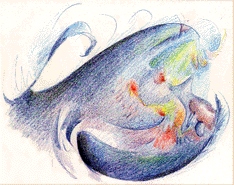
Envision, drawing
|
|
Tschwai, tall, questing, notebook open, sent signals of needing.
The University Writing Center was swarming midday as he watched, centered, focused, waiting for his opening.
I peeked out of an office to check the time, glancing his way, noticing his longing. Looking around, all Writing Center Interns were busy. I had just enough time to swallow lunch before another class. I made note to grab someone to help him as I unwrapped a sandwich. Opening my mouth to take a bite, he appeared at the open door, notebook open in his hand, eyes animal wild with desperation.
He said he needed someone to read his story, help him with writing. His broken English was almost decipherable. The longing in his voice and expression were completely clear.
I rewrapped my sandwich. We sat at a table in the Writing Center where he worked with an "English as a Second Language" (ESL) book, two dictionaries (one English and one Japanese translator) and his open notebook. His red lacquered notebook was open to the first page. On the page was his summary of a story for the ESL book, written in a calligraphic penmanship that danced like little people across the paper.
He wanted help with grammar, he said. He handed me a pen and began reading in very broken English the pronunciations of his words. The sentences were crudely formed; the ideas were clearly stated. A few of the words were used the way his culture saw the world, summarized in a "Zen" holistic sort of perspective. It took me a while to figure out from his spelling "aliht" that "all right" was the phrase he meant and he was using it in a variety of ways. He used it in one sentence where the situation could be potentially dangerous, to assure the reader that the people were okay. In another place he used "aliht" to explain that the situation was under control. And another to describe the people being ready for anything.
In several sentences, the ideas he had written showed a global comprehension of the content of his reading. But it was evident that he was writing as though he were speaking Japanese, his native language. Verb tenses were slightly mismatched. Nouns and verbs were switched around. Prepositional phrases were completely transposed.
His dancing letter forms made some of his writing difficult to read. We struggled over several words with me reading the sentence over and over like a contestant in a game show, trying to guess the word, another word that I thought fit from the context it was used in, or by rhyming a word that I thought I was reading.

First Page, drawing
Tschwai was very patient. He and I read aloud together, one sentence at a time. He would re-pronounce the words until they sounded right to him.
I would say the sentence the way it would be spoken "properly" in English, but kept his word choices. Then he said it the correct way too. He wanted me to make the correction on his writing while he watched.
We worked slowly for the first 15 minutes or so, while we read and re-read each sentence aloud one by one. We got through two sentences.
Interspersed in our work, we carried on a friendly conversation. I asked his name and where he was from. He asked if I knew where the ESL classroom building was on campus. When I said yes, it pleased him.
As we continued our work, he checked his watch more frequently. He had a class, it appeared. But we poured over his words, and he was determined and motivated to complete this process.
Tschwai attempted to translate the concept that despite the possibility of danger, the characters of the story in the ESL book were concerned about the situation they were in, but they were also "aliht." But he actually wanted a different word. The only word he could find to translate his intended meaning from Japanese had the meaning of how "a warrior would be just before battle." The meaning loosely translated to "serious."
What he meant was "determined, concerned, motivated, focused, worried, charged up and ready for anything." I mentioned these and other words that touched on the concept he was after. None were the right word. He was looking for the one succinct word to describe what just took me a paragraph. Actually they all could have been used to offer a glimpse of the big idea he so desperately wanted to portray. He chose the most simple form.
By the end of our session, we had made it all the way through his writing. He asked when I would be in the Writing Center again. That was the baby step toward trusting a teacher, a writing process, his own language acquisition abilities. Tschwai closed his shiny red notebook and smiled a deeply peaceful smile.
